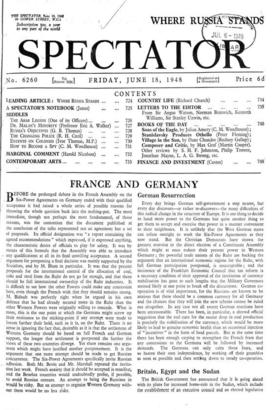German Resurrection
Every day brings German self-government a step nearer, but every day discovers—or rather re-discovers—the many difficulties of this radical change in the structure of Europe. It is one thing to decide to hand more power to the Germans but quite another thing to get them to accept and exercise that power in a manner convenient to their neighbours. It is unlikely that the West German states can refuse outright to work the Six-Power Agreements as they now stand. But the Christian Democrats have shown the greatest aversion to the direct election of a Constituent Assembly which might at once reduce their present power in Western Germany ; the powerful trade unions of the Ruhr are backing the argument that an international economic regime for the Ruhr, with full German participation postponed, is unacceptable ; and the insistence of the Frankfurt Economic Council that tax reform is a necessary condition of their approval of the institution of currency stabilisation has gone to such lengths that the Military Governors seemed likely at one point to break off the discussions. German co- operation is of vital importance, for the Russian; are known to be anxious that there should be a common currency for all Germany and the chances that they will join the new scheme cannot be ruled out altogether. In any case not all recent German reactions have been unreasonable. There has been, in particular, a shrewd official suggestion that the real cure for the recent drop in coal production is precisely the stabilisation of the currency, which would be more likely to lead to genuine economic health than an occasional injection of "incentives " in the form of food parcels. But at the same time there has been enough carping to strengthen the French fears that any concessions to the Germans will be followed by increased demands. The Germans can only calm these fears, and so hasten their own independence, by working off their grumbles as soon as possible and then settling down to steady co-operation.


































